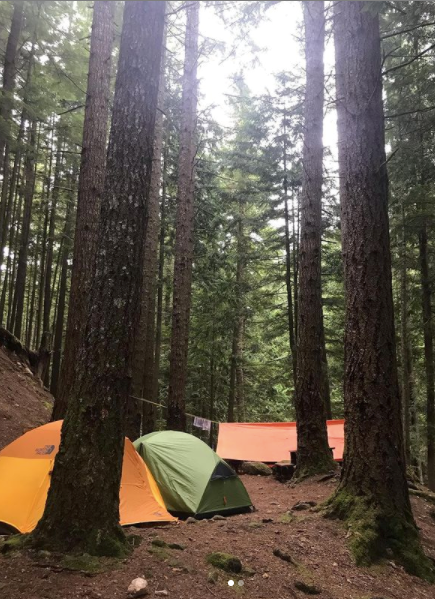On the morning of Aug. 4, Sgt. Simon Gravel of the Conservation Officer Service told The Chief that authorities had set a bear trap and captured the animal.
The sub-adult male black bear, which is roughly between two to three years old, had been accessing food on picnic tables and tents at the recreation site, forcing officials to shut down the area.“There’s nothing we can do with a bear like this other than euthanizing it. It's very unfortunate that relocating a bear like this — we know that the bear will come back. Relocation doesn't work as a solution,” said Gravel.
“That's a behaviour that was learned, and this is obviously compromising the safety of campers. And, you know, [it's] walking distance from the Paradise campground, [it’s] walking distance from the Alice Lake campground — from other campgrounds in Squamish. For this bear, it will be nothing to start investigating every tent in the area.”The campground was closed over the weekend, on Aug. 1, because the animal posed a safety risk.
Gravel said the area will remain closed until authorities can draft up a new policy that will prevent such a problem from recurring.
Younger, smaller bears like this one end up in this situation because campers tend to tolerate them, he said.These bears aren’t very intimidating, so recreationalists will let them stay around, take pictures, and even offer them food.
As a result, in these cases, they often become too comfortable around people and start breaking into tents.“You should never tolerate a bear, or approach a bear or feed a bear,” Gravel said.
First off, people should never leave any kind of food out unattended for even the shortest period of time. Even a five-minute walk around the lake is enough time for a bear to steal the food.Bear aware tips
If a bear comes close to you, make it known that its presence is not wanted.
“Make it a negative experience for the bear,” Gravel said. “Talk to the bear, and tell him he’s not welcome there. Everything you do that makes the bear more comfortable around the site or your residential area [contributes] to this bear becoming more domesticated.”If a bear becomes too comfortable in an area, it may start inviting itself into your house, he said.
People need to be aware that they must secure their bear attractants, and, if not, this will keep happening, Gravel added.As the fruits ripen and the fall gets closer, Gravel urged people to pick fruits from their gardens and eliminate all attractants, as bears’ feeding behaviour will ramp up.
Tickets handed out
In the meantime, conservation has been out patrolling for fires.
Gravel said that aside from himself, there are two other conservation officers in the Sea to Sky, though they often work with other authorities like the RCMP.Between July 28 and Aug. 4, conservation handed out six tickets for illegal fires, which are $1,150 apiece.
Each ticket is given to a person who was at a fire. Anyone standing by a fire can be sure to be ticketed, he said.There were about three to four illegal fires during that period.
Gravel noted that propane fires are allowed, so if people choose to report a fire, they must identify it as a wood-burning fire.Smoking is not recommended and leaving cigarette butts is dangerous and illegal, he added.




